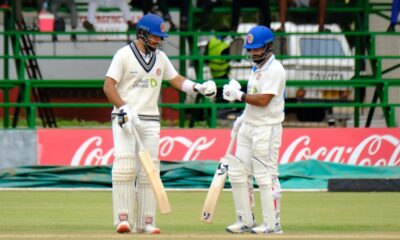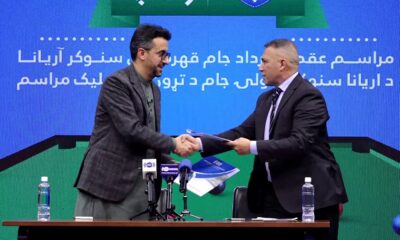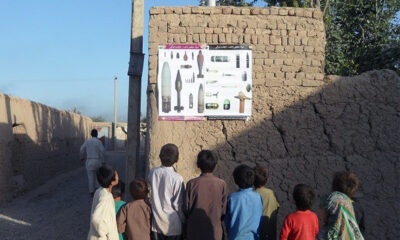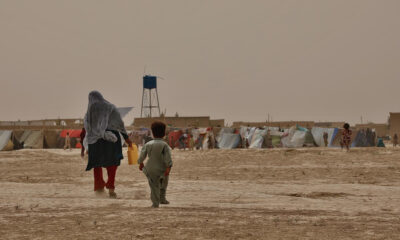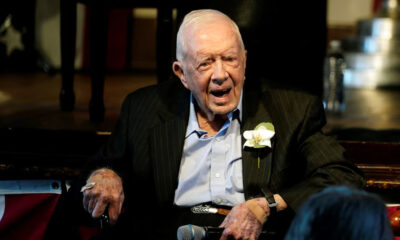World
North Korea says it launched ICBM to warn US, South Korea over drills
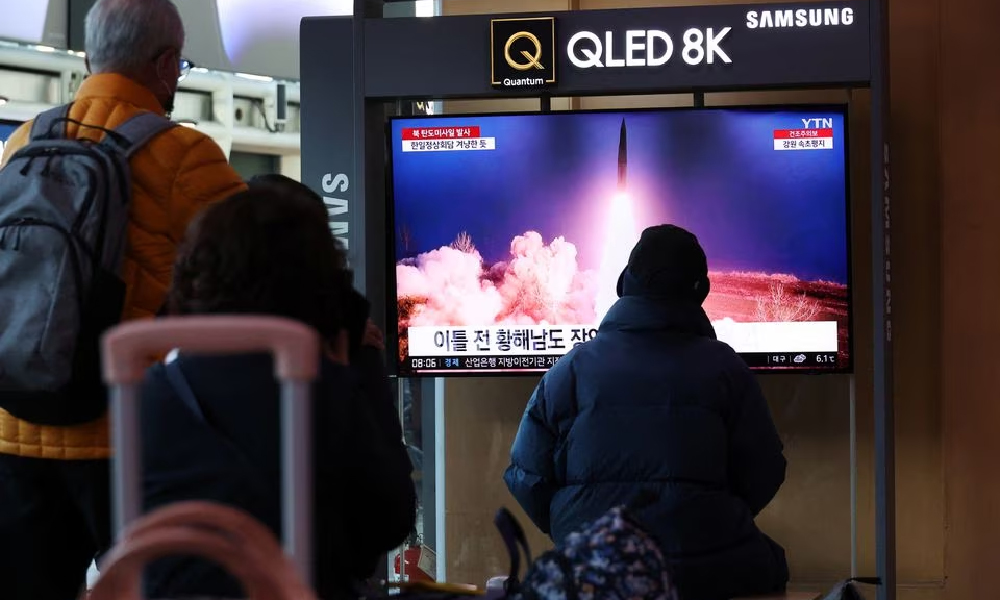
North Korea said that Thursday's launch was its largest Hwasong-17 intercontinental ballistic missile (ICBM), fired during a drill to demonstrate a "tough response posture" to ongoing U.S.-South Korea military drills, state media reported.
Photos released on Friday by the country's government media showed Kim Jong Un watching the launch with his daughter, and included pictures from space apparently shot by a camera mounted on the missile, Reuters reported.
North Korea fired the ICBM into the sea between the Korean peninsula and Japan on Thursday, hours before South Korea's president flew to Tokyo for a summit that discussed ways to counter the nuclear-armed North.
"The launching drill of the strategic weapon serves as an occasion to give a stronger warning to the enemies intentionally escalating the tension in the Korean peninsula while persistently resorting to irresponsible and reckless military threats," state news agency KCNA said.
The North's ballistic missiles are banned under United Nations Security Council resolutions and the launch drew condemnation from governments in Seoul, Washington and Tokyo.
South Korean and American forces began 11 days of joint drills, dubbed "Freedom Shield 23," on Monday, held on a scale not seen since 2017 to counter the North's growing threats, read the report.
Kim accused the United States and South Korea of increasing tensions with the military drills.
He "stressed the need to strike fear into the enemies, really deter war and reliably guarantee the peaceful life of our people and their struggle for socialist construction by irreversibly bolstering up the nuclear war deterrent," KCNA reported.
China, which has a defense pact with North Korea, also blamed the United States for the current tensions, saying they are caused by Washington's efforts to increase pressure on Pyongyang.
The Hwasong-17 is North Korea's biggest missile yet, and is the largest road-mobile, liquid-fuelled ICBM in the world.
It is believed to have the range to potentially deliver a nuclear warhead to targets anywhere in the United States, Reuters reported.
The missile was launched from Pyongyang's airport, and KCNA said it traveled up to a maximum altitude of 6,045 km (3,756 mi) and flew a distance of 1,000 km (621 mi) for just over 69 minutes, before falling into the open sea. The launch did not pose a safety threat to any neighbouring countries, the report said.
World
Jimmy Carter, former US president and Nobel Peace Prize recipient, dead at 100
Carter won the Nobel Peace Prize in 2002 for his efforts to promote human rights and resolve conflicts around the world, from Ethiopia and Eritrea to Bosnia and Haiti.
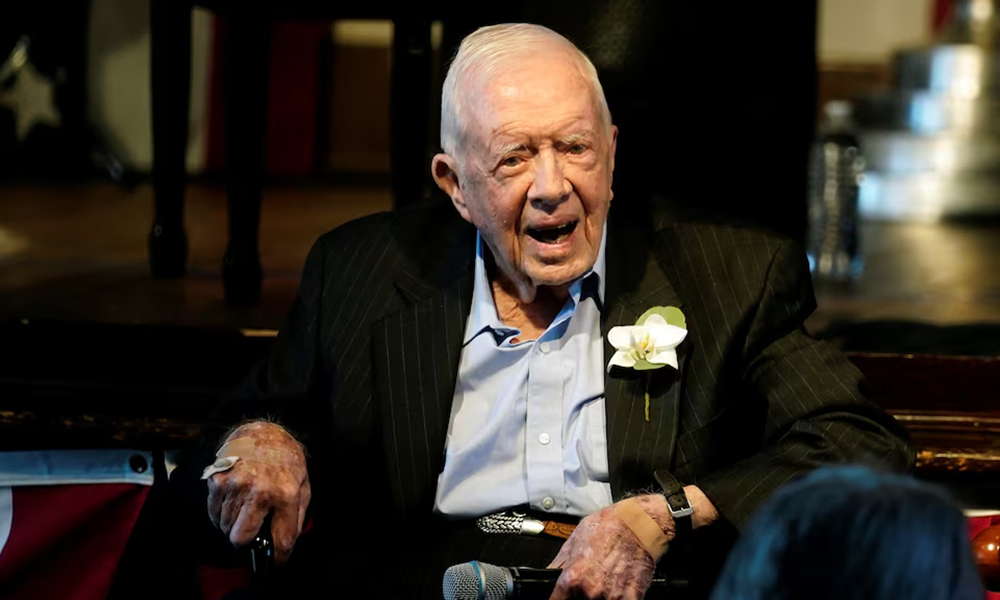
Jimmy Carter, the earnest Georgia peanut farmer who as U.S. president struggled with a bad economy and the Iran hostage crisis but brokered peace between Israel and Egypt and later received the Nobel Peace Prize for his humanitarian work, died at his home in Plains, Georgia, on Sunday. He was 100, Reuters reported.
Carter, a Democrat, became president in January 1977 after defeating incumbent Republican President Gerald Ford in the 1976 election. His one-term presidency was marked by the highs of the 1978 Camp David accords between Israel and Egypt, bringing some stability to the Middle East.
But it was also dogged by an economic recession, persistent unpopularity and the Iran hostage crisis that consumed his final 444 days in office. Carter ran for re-election in 1980 but was swept from office in a landslide as voters embraced Republican challenger Ronald Reagan, the former actor and California governor.
Carter lived longer than any U.S. president and, after leaving the White House, earned a reputation as a committed humanitarian. He was widely seen as a better former president than he was a president - a status he readily acknowledged, read the report.
World leaders and former U.S. presidents paid tribute to a man they praised as compassionate, humble and committed to peace in the Middle East.
"His significant role in achieving the peace agreement between Egypt and Israel will remain etched in the annals of history," said Egyptian President Abdel Fattah al-Sisi in a post on X.
The Carter Center said there will be public observances in Atlanta and Washington. These events will be followed by a private interment in Plains, it said.
Final arrangements for the former president's state funeral are still pending, according to the center.
In recent years, Carter had experienced several health issues including melanoma that spread to his liver and brain. Carter decided to receive hospice care in February 2023 instead of undergoing additional medical intervention. His wife, Rosalynn Carter, died on Nov. 19, 2023, at age 96. He looked frail when he attended her memorial service and funeral in a wheelchair.
Carter left office profoundly unpopular but worked energetically for decades on humanitarian causes. He was awarded the Nobel Peace Prize in 2002 in recognition of his "untiring effort to find peaceful solutions to international conflicts, to advance democracy and human rights, and to promote economic and social development."
Carter had been a centrist as governor of Georgia with populist tendencies when he moved into the White House as the 39th U.S. president. He was a Washington outsider at a time when America was still reeling from the Watergate scandal that led Republican Richard Nixon to resign as president in 1974 and elevated Ford from vice president.
"I'm Jimmy Carter and I'm running for president. I will never lie to you," Carter promised with an ear-to-ear smile.
Asked to assess his presidency, Carter said in a 1991 documentary: "The biggest failure we had was a political failure. I never was able to convince the American people that I was a forceful and strong leader."
Despite his difficulties in office, Carter had few rivals for accomplishments as a former president. He gained global acclaim as a tireless human rights advocate, a voice for the disenfranchised and a leader in the fight against hunger and poverty, winning the respect that eluded him in the White House.
Carter won the Nobel Peace Prize in 2002 for his efforts to promote human rights and resolve conflicts around the world, from Ethiopia and Eritrea to Bosnia and Haiti. His Carter Center in Atlanta sent international election-monitoring delegations to polls around the world.
A Southern Baptist Sunday school teacher since his teens, Carter brought a strong sense of morality to the presidency, speaking openly about his religious faith. He also sought to take some pomp out of an increasingly imperial presidency - walking, rather than riding in a limousine, in his 1977 inauguration parade.
The Middle East was the focus of Carter's foreign policy. The 1979 Egypt-Israel peace treaty, based on the 1978 Camp David accords, ended a state of war between the two neighbors, Reuters reported.
Carter brought Egyptian President Anwar Sadat and Israeli Prime Minister Menachem Begin to the Camp David presidential retreat in Maryland for talks. Later, as the accords seemed to be unraveling, Carter saved the day by flying to Cairo and Jerusalem for personal shuttle diplomacy.
The treaty provided for Israeli withdrawal from Egypt's Sinai Peninsula and establishment of diplomatic relations. Begin and Sadat each won a Nobel Peace Prize in 1978.
By the 1980 election, the overriding issues were double-digit inflation, interest rates that exceeded 20% and soaring gas prices, as well as the Iran hostage crisis that brought humiliation to America. These issues marred Carter's presidency and undermined his chances of winning a second term.
On Nov. 4, 1979, revolutionaries devoted to Iran's Ayatollah Ruhollah Khomeini had stormed the U.S. Embassy in Tehran, seized the Americans present and demanded the return of the ousted shah Mohammad Reza Pahlavi, who was backed by the United States and was being treated in a U.S. hospital.
The American public initially rallied behind Carter. But his support faded in April 1980 when a commando raid failed to rescue the hostages, with eight U.S. soldiers killed in an aircraft accident in the Iranian desert.
Carter's final ignominy was that Iran held the 52 hostages until minutes after Reagan took his oath of office on Jan. 20, 1981, to replace Carter, then released the planes carrying them to freedom.
In another crisis, Carter protested the former Soviet Union's 1979 invasion of Afghanistan by boycotting the 1980 Olympics in Moscow. He also asked the U.S. Senate to defer consideration of a major nuclear arms accord with Moscow.
Unswayed, the Soviets remained in Afghanistan for a decade.
Carter won narrow Senate approval in 1978 of a treaty to transfer the Panama Canal to the control of Panama despite critics who argued the waterway was vital to American security. He also completed negotiations on full U.S. ties with China.
Carter created two new U.S. Cabinet departments - education and energy. Amid high gas prices, he said America's "energy crisis" was "the moral equivalent of war" and urged the country to embrace conservation. "Ours is the most wasteful nation on earth," he told Americans in 1977.
In 1979, Carter delivered what became known as his "malaise" speech to the nation, although he never used that word.
"After listening to the American people I have been reminded again that all the legislation in the world can't fix what's wrong with America," he said in his televised address.
"The threat is nearly invisible in ordinary ways. It is a crisis of confidence. It is a crisis that strikes at the very heart and soul and spirit of our national will. The erosion of our confidence in the future is threatening to destroy the social and the political fabric of America."
As president, the strait-laced Carter was embarrassed by the behavior of his hard-drinking younger brother, Billy Carter, who had boasted: "I got a red neck, white socks, and Blue Ribbon beer."
Jimmy Carter withstood a challenge from Massachusetts Senator Edward Kennedy for the 1980 Democratic presidential nomination but was politically diminished heading into his general election battle against a vigorous Republican adversary.
Reagan, the conservative who projected an image of strength, kept Carter off balance during their debates before the November 1980 election.
Reagan dismissively told Carter, "There you go again," when the Republican challenger felt the president had misrepresented Reagan's views during one debate.
Carter lost the 1980 election to Reagan, who won 44 of the 50 states and amassed an Electoral College landslide.
James Earl Carter Jr. was born on Oct. 1, 1924, in Plains, Georgia, one of four children of a farmer and shopkeeper. He graduated from the U.S. Naval Academy in 1946, served in the nuclear submarine program and left to manage the family peanut farming business.
He married his wife, Rosalynn, in 1946, a union he called "the most important thing in my life." They had three sons and a daughter.
Carter became a millionaire, a Georgia state legislator and Georgia's governor from 1971 to 1975. He mounted an underdog bid for the 1976 Democratic presidential nomination, and out-hustled his rivals for the right to face Ford in the general election, Reuters reported.
With Walter Mondale as his vice presidential running mate, Carter was given a boost by a major Ford gaffe during one of their debates. Ford said that "there is no Soviet domination of Eastern Europe and there never will be under a Ford administration," despite decades of just such domination.
Carter edged Ford in the election, even though Ford actually won more states - 27 to Carter's 23.
Not all of Carter's post-presidential work was appreciated. Former President George W. Bush and his father, former President George H.W. Bush, both Republicans, were said to have been displeased by Carter's freelance diplomacy in Iraq and elsewhere.
In 2004, Carter called the Iraq war launched in 2003 by the younger Bush one of the most "gross and damaging mistakes our nation ever made." He called George W. Bush's administration "the worst in history" and said Vice President Dick Cheney was "a disaster for our country."
In 2019, Carter questioned Republican Donald Trump's legitimacy as president, saying "he was put into office because the Russians interfered on his behalf." Trump responded by calling Carter "a terrible president."
Carter also made trips to communist North Korea. A 1994 visit defused a nuclear crisis, as President Kim Il Sung agreed to freeze his nuclear program in exchange for resumed dialogue with the United States. That led to a deal in which North Korea, in return for aid, promised not to restart its nuclear reactor or reprocess the plant's spent fuel.
But Carter irked Democratic President Bill Clinton's administration by announcing the deal with North Korea's leader without first checking with Washington.
In 2010, Carter won the release of an American sentenced to eight years hard labor for illegally entering North Korea.
Carter wrote more than two dozen books, ranging from a presidential memoir to a children's book and poetry, as well as works about religious faith and diplomacy. His book "Faith: A Journey for All," was published in 2018.
World
Fiery plane crash kills 179 in worst airline disaster in South Korea
The deadliest air accident on South Korean soil was also the worst involving a South Korean airline in nearly three decades, according to the transport ministry.
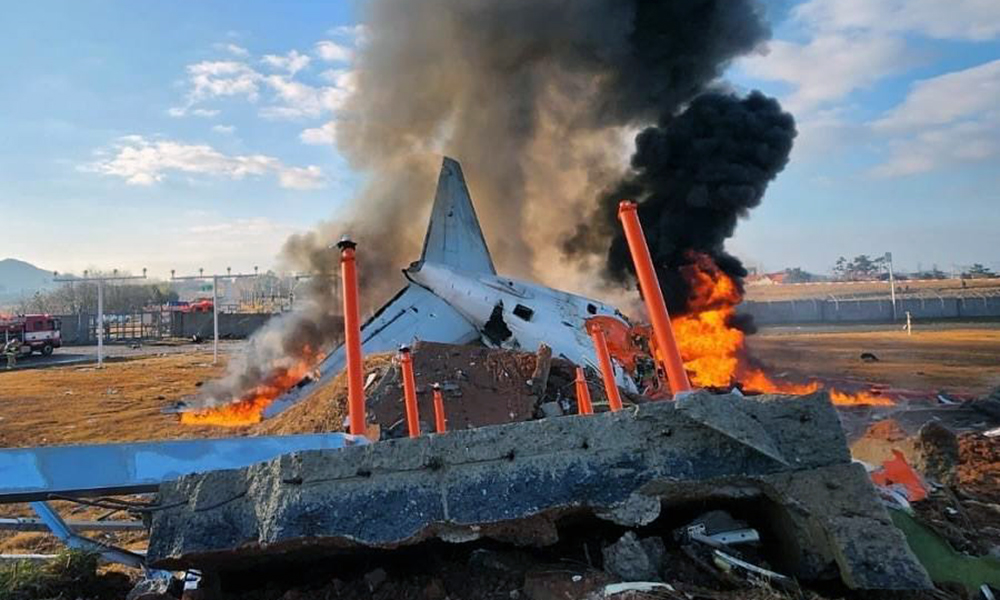
The deadliest air accident ever in South Korea killed 179 people on Sunday, when an airliner belly-landed and skidded off the end of the runway, erupting in a fireball as it slammed into a wall at Muan International Airport.
Jeju Air flight 7C2216, arriving from the Thai capital Bangkok with 175 passengers and six crew on board, was attempting to land shortly after 9 a.m. (0000 GMT) at the airport in the south of the country, South Korea's transport ministry said, Reuters reported.
Two crew members survived and were being treated for injuries.
The deadliest air accident on South Korean soil was also the worst involving a South Korean airline in nearly three decades, according to the transport ministry.
The twin-engine Boeing 737-800 was seen in local media video skidding down the runway with no visible landing gear before crashing into navigation equipment and a wall in an explosion of flames and debris.
"Only the tail part retains a little bit of shape, and the rest of (the plane) looks almost impossible to recognise," Muan fire chief Lee Jung-hyun told a press briefing.
The two crew members, a man and a woman, were rescued from the tail section of the burning plane, Lee said. They were being treated at hospitals with medium to severe injuries, said the head of the local public health centre.
Authorities combed nearby areas for bodies possibly thrown from the plane, Lee said.
Investigators are examining bird strikes and weather conditions as possible factors, Lee said. Yonhap news agency cited airport authorities as saying a bird strike may have caused the landing gear to malfunction.
The crash was the worst for any South Korean airline since a 1997 Korean Air crash in Guam that killed more than 200 people, according to transportation ministry data. The previous worst on South Korean soil was an Air China crash that killed 129 in 2002.
Experts said the bird strike report and the way the aircraft attempted to land raised more questions than answers.
"A bird strike is not unusual, problems with an undercarriage are not unusual," said Airline News editor Geoffrey Thomas. "Bird strikes happen far more often, but typically they don't cause the loss of an airplane by themselves."
Under global aviation rules, South Korea will lead a civil investigation into the crash and automatically involve the National Transportation Safety Board in the United States where the plane was designed and built.
'MY LAST WORDS'
Hours after the crash, family members gathered in the airport's arrival area, some crying and hugging as Red Cross volunteers handed out blankets.
Many victims appeared to be residents of nearby areas returning from vacation, officials said.
Families screamed and wept as a medic announced the names of victims identified by their fingerprints. Papers were circulated for families to write down their contact details.
One relative stood at a microphone to ask for more information from authorities. "My older brother died and I don’t know what’s going on," he said. "I don’t know."
Another asked journalists not to film. "We are not monkeys in a zoo," he said. "We are the bereaved families."
Mortuary vehicles lined up outside to take bodies away, and authorities said a temporary morgue had been established.
The crash site smelled of aviation fuel and blood, according to Reuters witnesses. Workers in protective suits and masks combed the area while soldiers searched through bushes.
The control tower issued a bird strike warning and shortly afterward the pilots declared mayday and then attempted to land from the opposite direction, a transport ministry official said.
A passenger texted a relative to say a bird was stuck in the wing, the News1 agency reported. The person's final message was, "Should I say my last words?"
The aircraft was manufactured in 2009, the transport ministry said.
The two CFM56-7B26 engines were manufactured by CFM International, a joint venture between GE Aerospace and France's Safran, the transport ministry said.
A CFM spokesperson said, "We are deeply saddened by the loss of Jeju Air flight 2216. We extend our heartfelt sympathies to the families and loved ones of those on board.”
CHALLENGE TO COUNTRY'S NEW INTERIM PRESIDENT
Jeju Air CEO Kim E-bae apologised for the accident, bowing deeply during a televised briefing.
He said the aircraft had no record of accidents and there were no early signs of malfunction. The airline will cooperate with investigators and make supporting the bereaved its top priority, Kim said.
No abnormal conditions were reported when the aircraft left Bangkok's Suvarnabhumi Airport, said Kerati Kijmanawat, president of Airports of Thailand.
The passengers included two Thai nationals and the rest are believed to be South Koreans, according to the transportation ministry.
It was the first fatal flight for Jeju Air, a low-cost airline founded in 2005 that ranks behind only Korean Air Lines and Asiana Airlines in terms of the number of passengers in South Korea.
The accident happened only three weeks after Jeju Air started regular flights from Muan to Bangkok and other Asian cities on Dec. 8.
Muan International is one of South Korea's smallest airports but it has seen the number of international passengers jump nearly 20 times to 310,702 from January to November from the same period in 2022, according to government data.
The Boeing model involved in the crash, a 737-800, is one of the world’s most flown airliners with a generally strong safety record. It was developed well before the MAX variant involved in a recent Boeing safety crisis.
Boeing said in a emailed statement, "We are in contact with Jeju Air regarding flight 2216 and stand ready to support them. We extend our deepest condolences to the families who lost loved ones, and our thoughts remain with the passengers and crew."
The U.S. Federal Aviation Administration did not immediately respond to a request for comment.
All domestic and international flights at Muan airport were cancelled, Yonhap reported.
South Korean acting President Choi Sang-mok, named interim leader of the country on Friday in an ongoing political crisis, arrived at the scene of the accident and said the government was putting all its resources into dealing with the crash.
Two Thai women were on the plane, aged 22 and 45, Thai government spokesperson Jirayu Houngsub said.
The Thai foreign ministry later confirmed both were among those killed. The embassy in Seoul was coordinating with the South Koreans and arranging for family members to travel from Thailand, the ministry said in a statement.
Thai Prime Minister Paetongtarn Shinawatra sent condolences to the families of the dead and injured in a post on X, saying she had instructed the foreign ministry to provide assistance.
World
North Korean troops experience mass casualties on Ukraine front lines, White House says
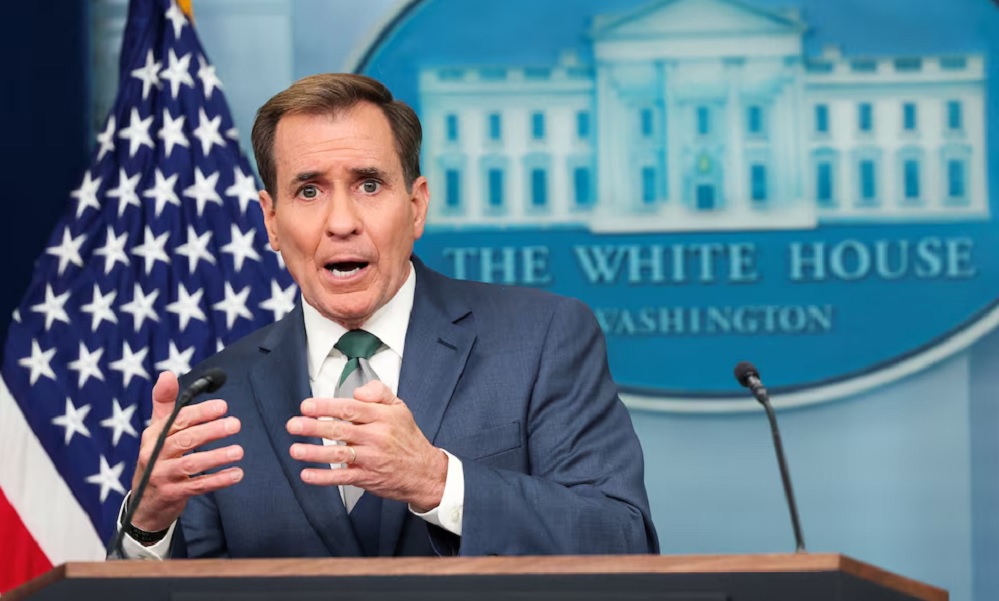
North Korean forces are experiencing mass casualties on the front lines of Russia's war against Ukraine, with a thousand of their troops killed or wounded in the last week alone in Russia's Kursk region, White House spokesperson John Kirby told reporters on Friday.
The number far exceeds the figure U.S. officials have previously provided, Reuters reported.
"It is clear that Russian and North Korean military leaders are treating these troops as expendable and ordering them on hopeless assaults against Ukrainian defenses," Kirby said, describing the North Korean troops' offensive as "massed, dismounted assaults."
North Korea's mission to the United Nations in New York did not immediately respond to a request for comment, and Russia's U.N. mission declined to comment.
Ukrainian President Volodymyr Zelenskiy, in his nightly video address, said North Korean forces had sustained "very significant" losses and were being sent into battle with only minimal protection from the Russian forces.
"We see that neither the Russian military nor their North Korean overseers have any interest in ensuring the survival of these North Koreans," he said.
"Everything is set up so that it is impossible for us to capture them. There are instances in which they are executed by their own forces. Russians send them into assaults with minimal protection."
He said Ukrainian forces had managed to take a few North Korean soldiers prisoner "but they were severely wounded and it was not possible to save their lives."
Koreans should not be losing their lives in a war in Europe, he said, and if China was sincere in not wanting the war to expand, "it needs to exert appropriate pressure on Pyongyang."
On Monday, Zelenskiy said more than 3,000 North Korean soldiers have been killed and wounded in Kursk region. He said he was citing preliminary data.
On Dec. 17, a U.S. military official said North Korea had suffered several hundred casualties in Kursk region.
Asked about what ranks the North Korean casualties included, the military official, speaking on the condition of anonymity, said it was from lower-level troops to "very near to the top."
In his comments, White House spokesperson Kirby said President Joe Biden would likely approve another security assistance package for Ukraine in coming days.
Earlier this week, Biden condemned Russia's Christmas Day attacks on Ukraine's energy system and some of its cities and asked the Defense Department to continue its surge of weapons to Ukraine.
Reuters was unable to independently verify reports of combat losses or accounts from either side.
-
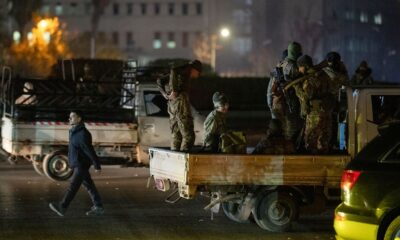
 World5 days ago
World5 days ago14 Syrian police killed in ambush as unrest spreads
-

 Latest News5 days ago
Latest News5 days agoEx-Pakistan envoy says US no longer values her country due to Afghanistan
-

 Business4 days ago
Business4 days agoRussia is using bitcoin in foreign trade, finance minister says
-

 Latest News4 days ago
Latest News4 days agoPakistan confirms airstrikes in Afghanistan
-
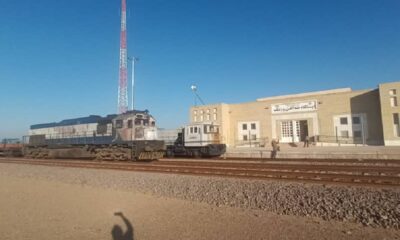
 Business3 days ago
Business3 days agoChina’s first railway consignment arrives in Afghanistan via Iran
-
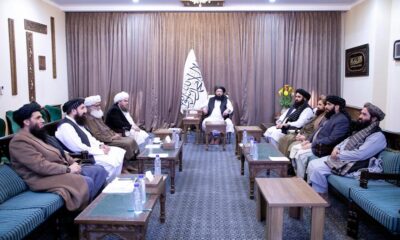
 Latest News2 days ago
Latest News2 days agoAfghanistan as independent country has the right to self-defense: Arg
-
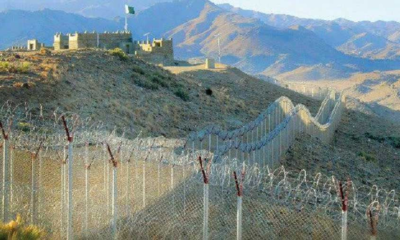
 Latest News2 days ago
Latest News2 days agoAfghanistan carries out retaliatory attack against Pakistan
-
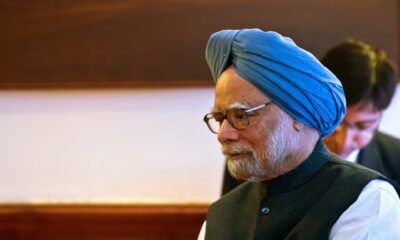
 Regional4 days ago
Regional4 days agoManmohan Singh, India’s reluctant prime minister, dies aged 92


